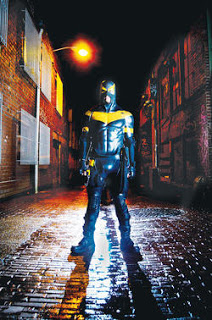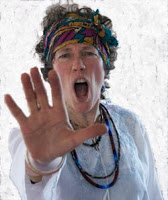Good morning! This is my first blog post of this new year. And it’s another chilly wintery rainy day in the glorious Emerald City that is Seattle.
Today I’m talking about a self-defense success story with a “found” weapon. About a decade ago I was working with a downtown company. They brought me in to teach their staff some self-defense, because one had been assaulted, right by their building.
She was on her break, and gone downstairs for a cigarette. As she stood near the entry, she could not help but notice the youngish man walking and yelling. She noticed that he was dressed well, seemed well groomed, and decided he must be on a phone call (remember back then we had these bluetooth earpieces that made us look oh so cool?). So her attention to him drifted away — for about two seconds. Next thing she knew, that same youngish man had her slammed against the wall, and his hands were around her throat. And then, almost as suddenly, he was running away; she realized she had thrust her still-lit cigarette into his neck.
Now, I am not saying you should take up smoking so you can have a lit cigarette as your found weapon. However, when somebody does catch your attention, pay more mind to their behavior than to their attire. The suit and tie is just the wrapping paper, it tells you little about the contents, about their character or intent or state of mind.
Think of how you can use other everyday objects as your found weapon, should you need to. Pick up something, anything. Hold it, look at it, turn it in your hands. How can you use it against someone else’s vulnerabilities? Try a few slow-motion practice strikes. What do I have nearby? Oh a paintbrush. Not exactly the strongest stick, but if I grip it close to the end can I use it to poke someone’s eye or throat? What do you have nearby?
Winter term classes are still in person, and open for registration. Proof of vaccination is required, wearing your mask is required, and we’re making sure air circulation and filtration is in place and running.
Stay safe, live life.
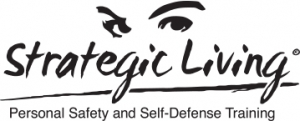
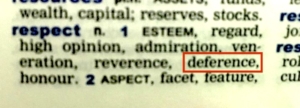
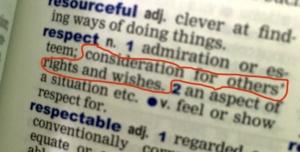 According to this same dictionary, here’s another aspect to respect.
According to this same dictionary, here’s another aspect to respect. uncomfortable. You have boundaries with everyone, even your family and best friends, that’s healthy. Even small ones. In a matter-of-fact manner, with confidence. Manipulators hate having boundaries set. You might experience a bit of pushback, to see if those boundaries are real. So keep them real as you set them. And set them
uncomfortable. You have boundaries with everyone, even your family and best friends, that’s healthy. Even small ones. In a matter-of-fact manner, with confidence. Manipulators hate having boundaries set. You might experience a bit of pushback, to see if those boundaries are real. So keep them real as you set them. And set them